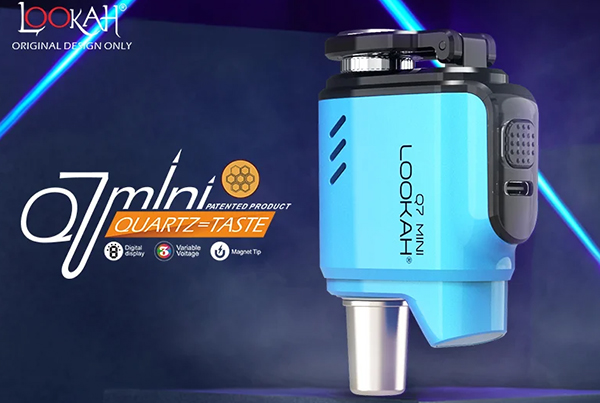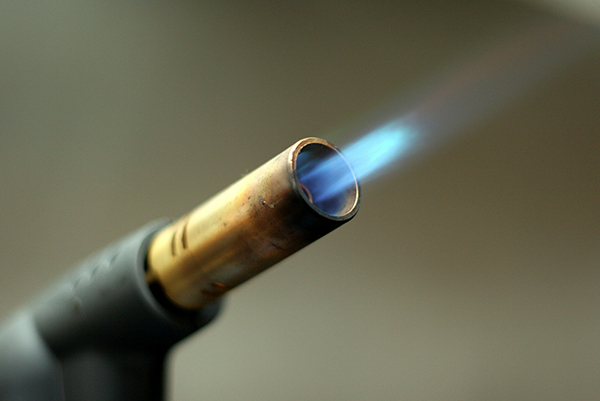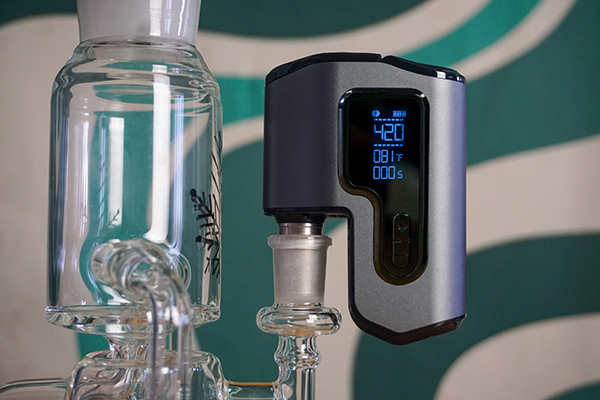Enails vs Torch: Which is better for dabbing

Enails vs. Torch: Which is better for dabbing?

As cannabis concentrate products capture consumer’s hearts and minds, the number of ways to consume them is growing.
The conventional “dab rig” is still a popular go-to method, devices designed specifically for concentrates like budder and sugar. Dab rigs require heating a metal, glass, or ceramic nail before applying small amounts of concentrates that combust on contact, typically done with a small blowtorch.
However, recent tech advancements have brought enails onto the scene, replacing the flame with electric heating mechanisms.
When it comes to using enails vs. torches with a dab rig, which one is best for you? Here, we’ll go through the benefits and drawbacks of each device so you can make the most educated decision for your next session.
What is a torch, and how is it used?

A torch is exactly as it sounds - a small, handheld blowtorch used to heat your nail (also called a banger), which is a part of your dab rig where the concentrate is placed.
Dabbing torches come in various sizes, strengths, and compatible gases; butane is common. Often, dabbing torches are mini torches or culinary torches applied for this purpose, and dabbers prefer smaller models for ease of use and safety.
Some torches allow you to control the size of the flame, while others are more basic and only have a single setting.
Dabbing torches are used with a traditional dab rig fitted with a bucket, also known as a banger, which is a piece designed specifically for use with concentrates like wax or shatter.
Turn on your torch (only after reading the safety instructions!) and apply heat to the nail until it’s red-hot.
Once heated, allow the nail to cool briefly; the precise time required to cool to an optimal temperature for vaporization may vary depending on the material from which your nail is made. Then, drop your concentrate into the nail.
It’s important to note that your nail needs to be made of a material strong enough to withstand ultra-high temperatures; nails are typically made of titanium, ceramic, or, our preference, quartz.
Using a torch: Benefits and drawbacks
As one of the first ways to dab, torches come with several benefits, including:
More affordable: You can buy a basic dabbing torch for as little as $20. Other models with more features or of different sizes may cost more.
Straightforward: There’s no learning curve when using a torch. Make sure it has enough butane, turn it on, and heat your nail -- that’s it.
Doesn’t need electricity: Dabbing torches can be used anywhere at any time without needing to charge or hook up to an outlet. This makes them a great option for portability.
Being the first doesn’t necessarily mean it’s the best, though. Dabbing torches come with several disadvantages, including:
No way to control temperature: While some dabbing torches allow you to control the size of the flame, there’s no way to control the torch’s exact temperature output. It’s more than likely that you’ll heat your nail to temperatures way higher than necessary to release cannabinoids and terpenes. Plus, you’ll quickly burn through your material, creating a bitter taste closer to burnt toast than cannabis.
They can be dangerous: Needless to say, playing with fire isn’t the safest thing. Dabbing torches can reach temperatures as high as 2,500° Fahrenheit -- temperatures that can damage surfaces, burn through objects, and even seriously hurt someone when not handled properly.
What is an enail, and how is it used?

Enails, short for “electronic nails,” are devices designed to replace dabbing torches. Instead of cranking up an ultra-hot flame, enails use a heating coil to heat the banger.
Enails have two main components: a controller box and a coil that connects directly to the banger.
The controller box allows you to choose the precise temperature, and the coil heats to the exact degree you indicate. This has made enails a fast favorite among dabbers who prefer concentrates but struggle to keep the temperature of their blowtorches under control.
Enails are designed to make it easier to control temperature, making them especially useful for low temp dabbing, which preserves the concentrate's flavor. A newer range of enails, such as the Lookah Q7, attach to the down stem of the dab rig and are a quartz coil and control box, all in a portable battery-powered device. So, rather than a heating coil wrapped around your banger, they act as an electric banger and are essentially vape devices for your dab rig that replace the banger.
To use an enail, connect your enail to a power source or charge it if your model is rechargeable. If needed, connect the coil to the banger; turn on the enail, select your temperature, and wait for the enail to indicate that the set degree has been reached. Dab as usual.
In recent years, there has been a large push towards enails as they have become smaller. The LOOKAH Q7 and the smaller Q7 Mini have been some of the most popular products for that exact reason.
Higher-end models, such as the Q7, have additional features allowing users to step up their dabbing game.
Using an enail: Benefits and drawbacks
Here are some of the benefits of using an enail:
Precise temperature control: The enail’s leading advantage over a dabbing torch is the ability to carefully control the temperature. As we explained above, precise temperature control is key to unlocking certain cannabinoids, preserving terpenes, and avoiding the burned bitterness that comes with scorching your concentrates to death. An enail lets you fine-tune your session however you’d like.
Helps preserve flavor: The temperature control prevents your concentrates from tasting charred. By dabbing at the lower temperatures set by the enail, you preserve the delicate terpenes easily damaged by excessive heat.
Reduces thermal shock to nail: Heating up your nail too quickly can result in thermal shock, which is damage to an object due to a rapid and drastic change in temperature. An enail gradually raises the nail’s temperature, reducing the possibility that your nail will crack, warp, or otherwise sustain damage.
For all their benefits, enails has several drawbacks, including:
Needs a power source: Enails must be connected to an outlet or other power source to work. If you’re not near an outlet, or if it isn’t charged, you won’t be able to use your enail.
Not easy to carry around: A traditional enail can be bulky and unwieldy, as the controller box and coil take up space. Smaller and more refined units like the Q7 solve this problem and are easy to carry around if you want to dab on the go.
More expensive: Enails vary in price depending on the brand you buy. You can expect to spend about $75 to $100 on an entry-level model. This makes enails a significantly more expensive investment than torches, although you won’t need to pay for gas refills like you would a butane torch.
As the technology continues to develop, portable enail devices that more closely resemble electronic vaporizers have emerged as alternative options. These devices are designed for portability but offer the same advantages as enails over the conventional blowtorch method.
What to look for when choosing the Enail?
Choosing the right enail is essential for a satisfying and safe dabbing experience. There are several factors to consider when selecting an enail, ranging from performance and functionality to safety and personal preferences. Here’s a comprehensive guide on what to look for when choosing an enail:
- Temperature Control: Precise temperature control is one of the most crucial features of an enail. Look for a model that offers adjustable temperature settings, allowing you to fine-tune the heat to match your preferred dabbing temperature and the type of concentrate you’re using.
- Heating Element: Consider the type of heating element the enail uses. The most common options are ceramic, titanium, and quartz. Each material has its advantages, such as flavor purity (quartz), quick heating (titanium), or heat retention (ceramic). Choose one that aligns with your priorities.
- Compatibility: Ensure that the enail you choose is compatible with your preferred dab rig or glass water pipe. Different enails may have specific connection sizes and types, so check for compatibility before purchasing.
- Portability: Consider if you need a portable or desktop enail. Portable models are battery-powered and ideal for on-the-go use, while stationary ones are designed for home setups and require a continuous power source.
- Power Source: Enails can be powered by electricity or batteries. Electric models are usually more powerful and consistent but require a power outlet. Battery-powered enails offer portability but may have limitations in terms of heating capacity and runtime.
- Safety Features: Safety is a top priority. Look for enails with built-in safety features such as overheat protection, auto-shutoff, and short-circuit protection to prevent accidents.
- Size and Design: Consider the design and size of the enail. Choose a device that fits your dabbing setup and aesthetic preferences. Some enails have sleek, modern designs, while others may be more compact and discreet. Some can be adjusted to fit different bangers or dab rigs.
- Brand Reputation: Research reputable brands and read customer reviews to ensure you purchase a reliable and high-quality enail. Established brands often provide better customer support and product warranties.
- Budget: Set a budget and stick to it. Enails come in a wide price range, so options are available for various budgets. However, investing in a higher-quality enail may provide better performance and longevity.
- Warranty and Customer Support: Check if the enail comes with a warranty and consider the availability of customer support. A warranty can provide peace of mind in case of any manufacturing defects or issues.
- User-Friendliness: Ensure that the enail you choose is user-friendly and has no steep learning curve. A straightforward interface and clear instructions can make your dabbing experience more enjoyable.
By carefully considering these factors and assessing your specific preferences and needs, you can select the enail that best suits your dabbing style and enhances your overall cannabis concentrate experience.





